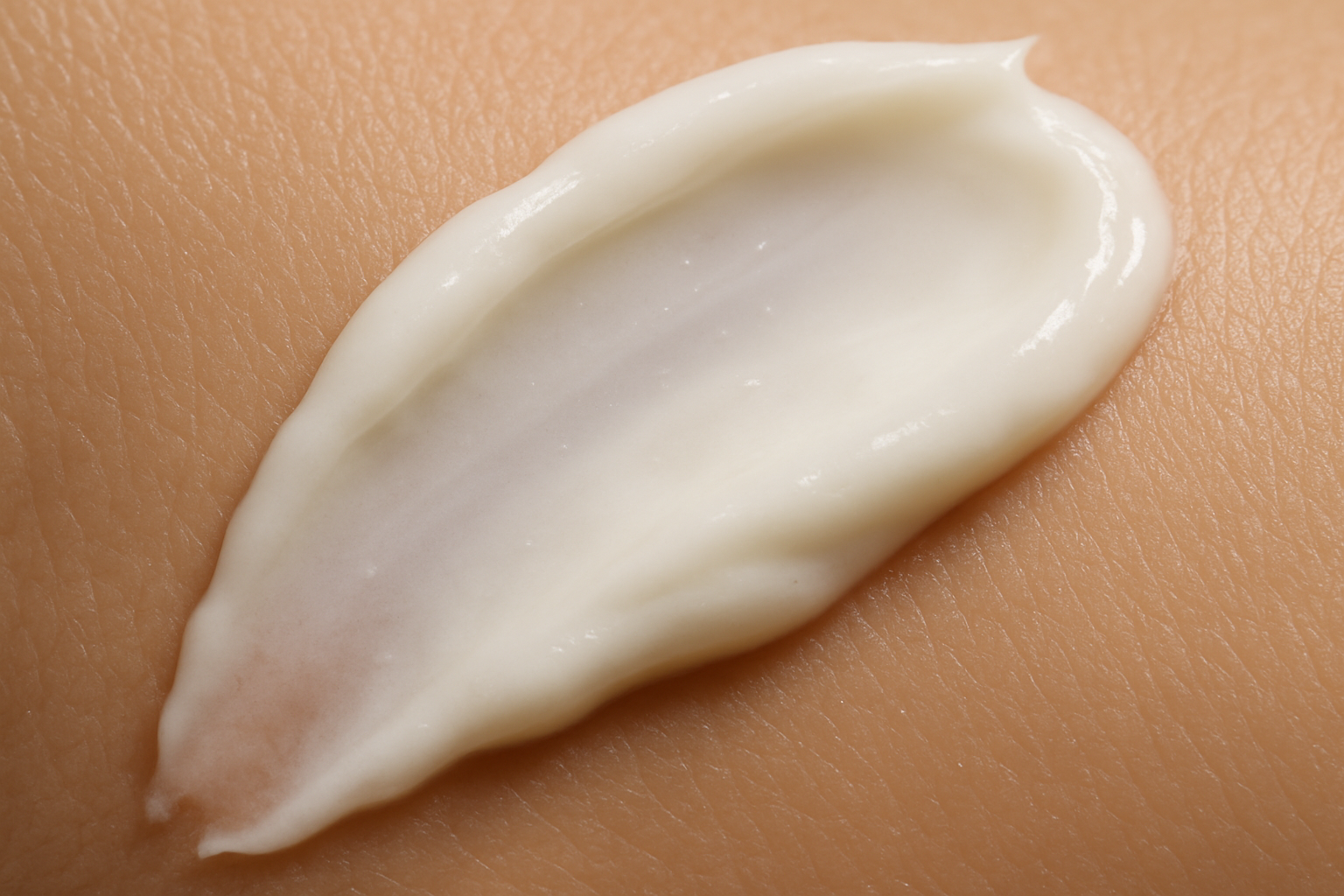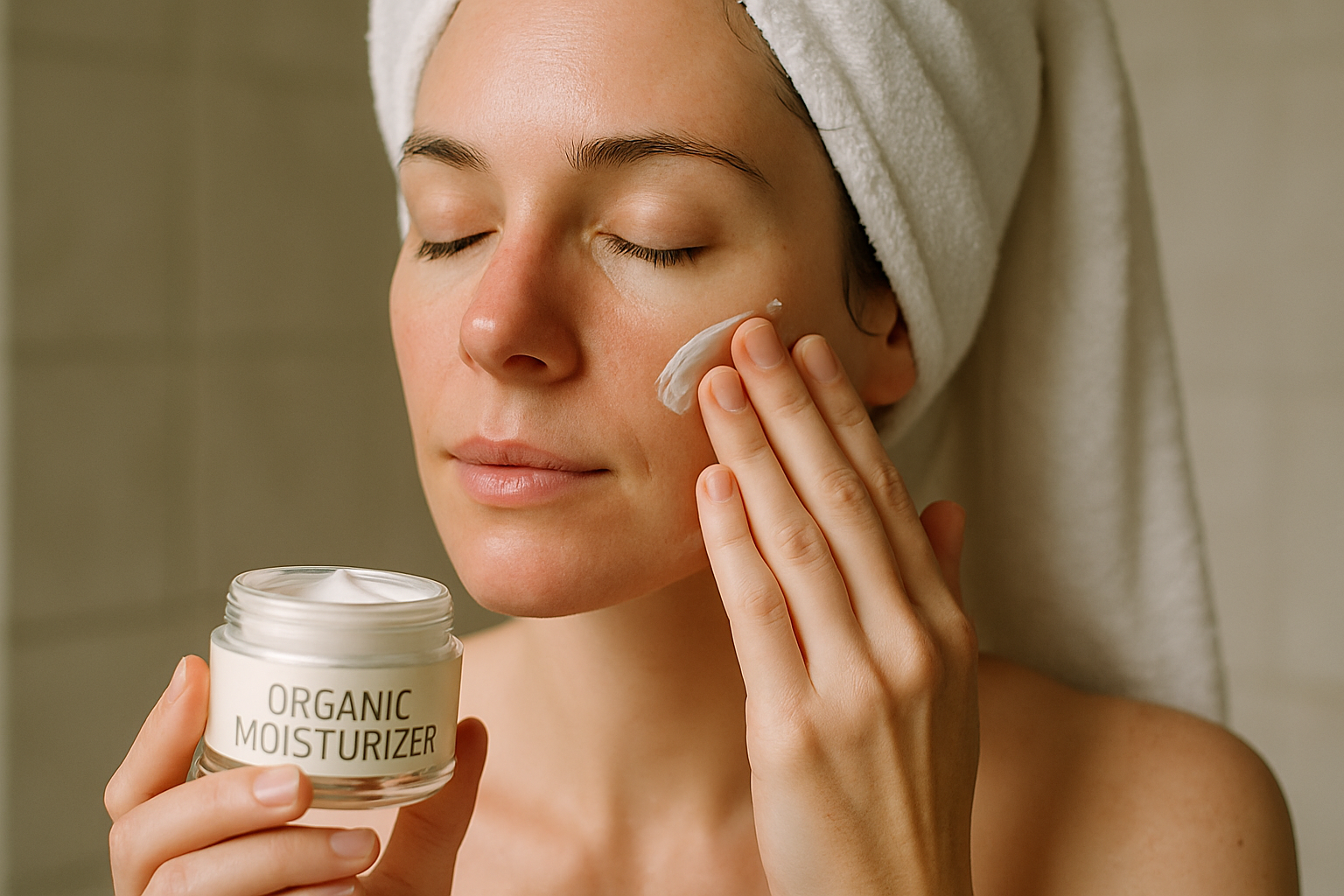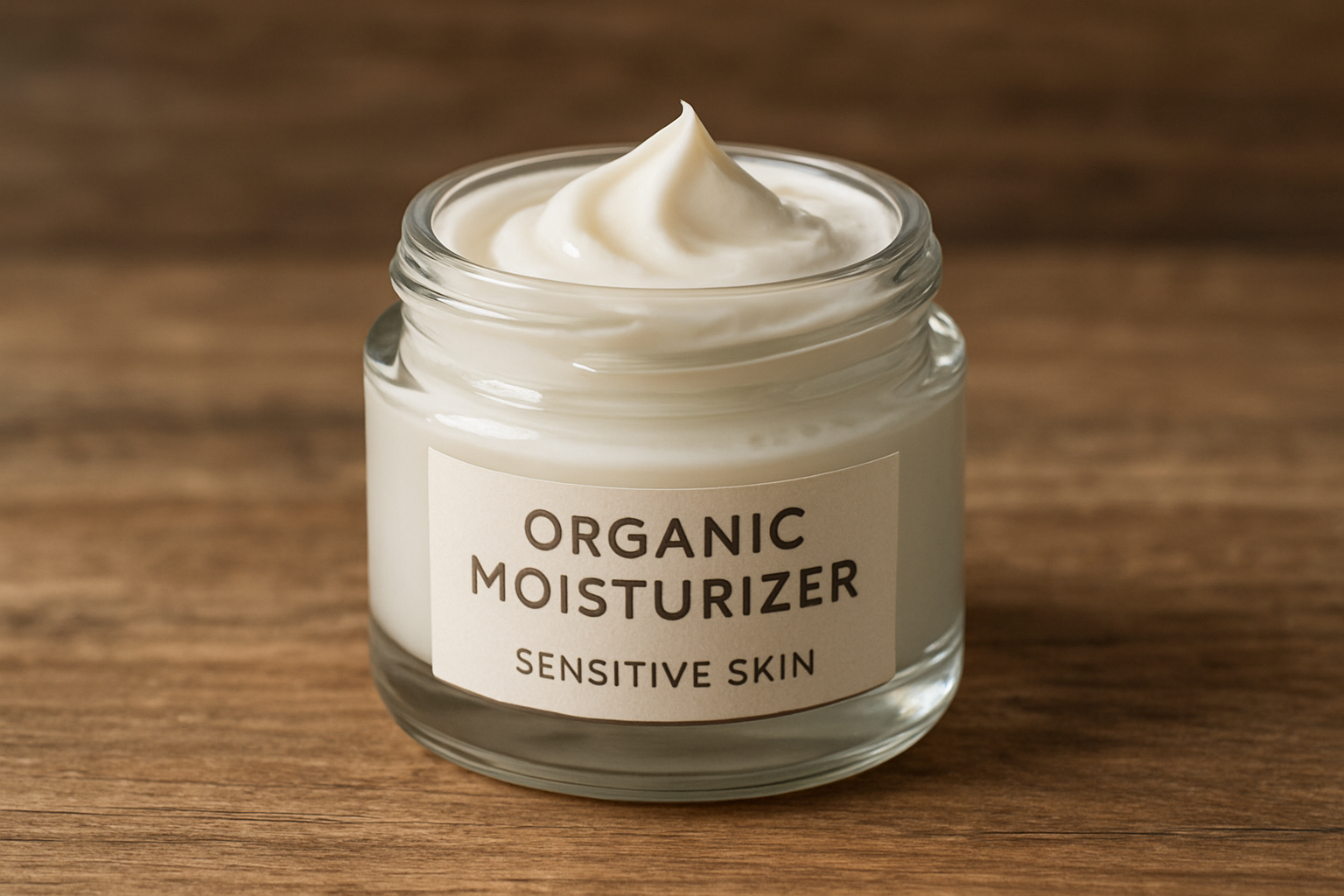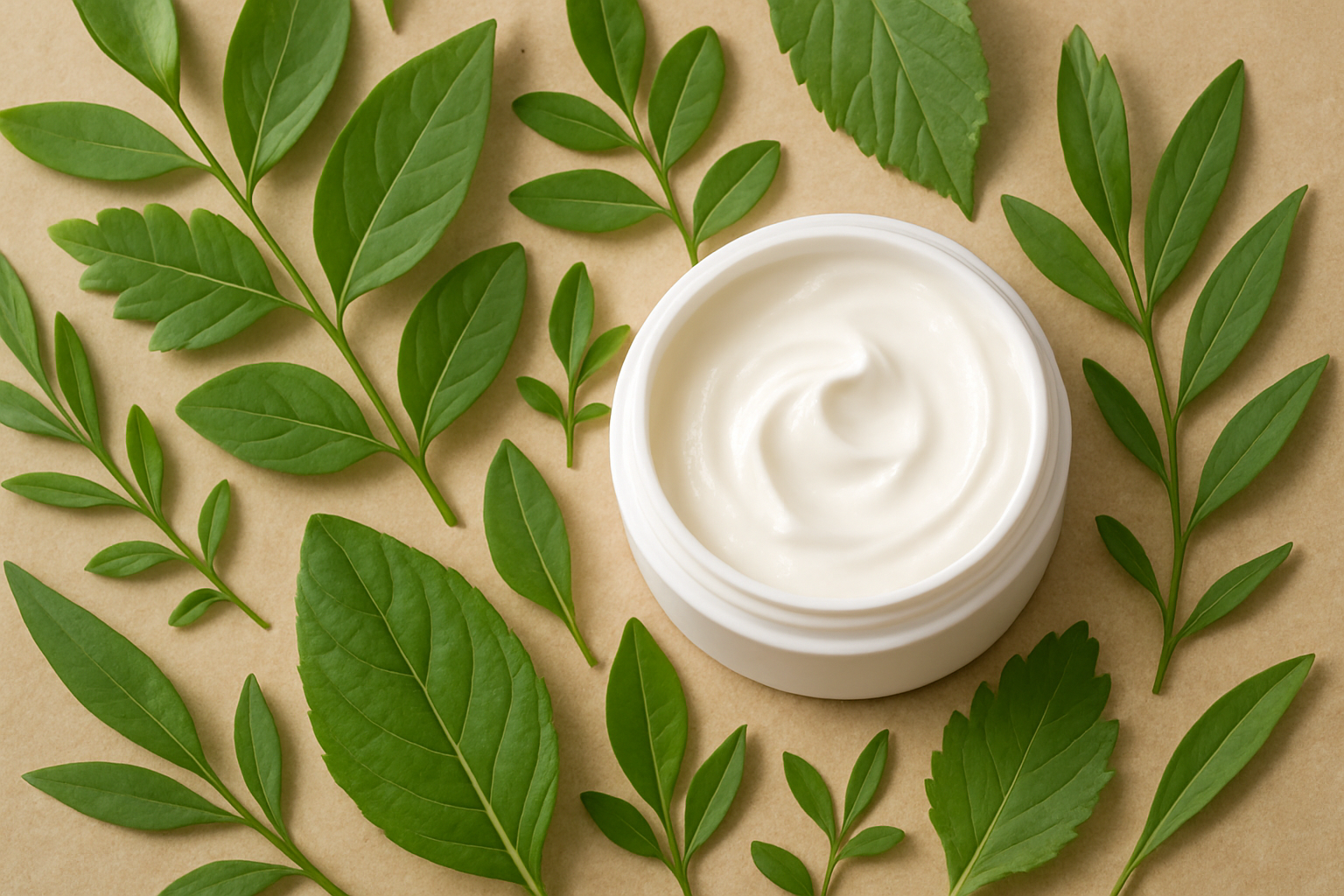
The Definitive Guide to Organic Moisturizer for Sensitive Skin: Nourish, Protect, and Care Gently
Share
Hydration is the foundation of healthy skin, and for those with sensitive skin, choosing the right moisturizer is crucial.
But what makes an organic moisturizer truly suitable for sensitive skin?
This guide provides everything you need: from understanding key ingredients to handpicked recommendations and sustainable skincare practices.
Some are deeply nourishing, using organic oils and butters that restore your skin’s natural barrier.
Some are formulated without fragrance, essential oils, or irritants to soothe redness and calm sensitivity.
Some offer a lightweight yet effective hydration, perfect for both day and night routines.
Some boast certifications like COSMOS, ensuring ethical sourcing and verified organic content.
Some combine luxury textures with sustainability—offering eco-friendly packaging that reflects a commitment to the planet.
Let's dive right in.
Table of Contents
-
Key Ingredients to Look for When Choosing an Organic Moisturizer
-
How to Use Organic Moisturizers Effectively for Sensitive Skin
-
Common Misconceptions About Organic Moisturizers for Sensitive Skin
-
-
Why Organic Moisturizers Are Essential for Sensitive Skin
Sensitive skin often reacts to synthetic chemicals, fragrances, and harsh preservatives found in many conventional moisturizers. These can trigger redness, irritation, and long-term barrier damage. Choosing an organic moisturizer means opting for a formulation prioritizing safety, transparency, and nourishment.
Organic moisturizers typically avoid synthetic dyes, parabens, sulphates, and artificial fragrances. Instead, they harness the power of natural extracts such as organic shea butter, aloe vera, and nourishing plant oils to hydrate and soothe the skin. Maintaining the skin’s moisture barrier is vital, especially when sensitivity makes it more easily compromised.
According to a detailed review by The Good Trade, moisturizers work by hydrating the surface layers and locking in moisture using a blend of humectants, occlusives, and emollients. This mechanism is essential for sensitive skin, which struggles with moisture retention.

Key Benefits of Organic Moisturizers for Sensitive Skin
- Gentle Hydration: With ingredients like hyaluronic acid and glycerin, organic moisturizers draw moisture in without irritation.
- Barrier Restoration: Ingredients such as ceramides and shea butter help rebuild the skin’s protective barrier.
- Soothing Properties: Colloidal oatmeal, calendula, and aloe vera reduce redness and calm inflammation.
- Free from Harmful Chemicals: Avoidance of fragrances and essential oils lowers allergic risk.
- Sustainable & Ethical: Organic certification ensures no harmful pesticides and cruelty-free practices.
Key Ingredients to Look for When Choosing an Organic Moisturizer
When selecting an organic moisturizer tailored for sensitive skin, it is vital to understand the ingredient categories that provide effective hydration without causing irritation.
Humectants: Attracting and Retaining Moisture
These draw water into the skin, helping maintain hydration levels. Favorites include:
- Hyaluronic Acid: Able to hold up to 1000x its weight in water, it provides lasting plumpness.
- Glycerin: A plant-derived humectant that balances moisture retention gently.
Occlusives: Sealing in Moisture
Occlusives form a protective layer to prevent moisture loss. For sensitive skin, gentle occlusives such as:
- Shea Butter: Rich in lipids, it nourishes while being non-comedogenic if used appropriately.
- Plant-Based Triglycerides: Softer alternatives to petroleum jelly that provide a velvety finish.
Emollients: Smoothing and Softening Texture
These blend humectants and occlusives, improving feel and appearance.
- Squalane: A vegan-friendly oil that mimics skin’s natural sebum, offering hydration without greasiness.
- Jojoba Oil: Balances oil production and boosts skin suppleness.
- Vitamin E: An antioxidant that supports skin repair and protects from environmental damage.
Advised to avoid are synthetic fragrances and essential oils which can cause flare-ups for sensitive skin, as affirmed by several experts and resources, including fragrance-free skincare recommendations.
Understanding Certifications: COSMOS and Why They Matter
Choosing a product with the COSMOS certified organic seal guarantees that it meets rigorous standards for organic content, ingredient sourcing, production, and sustainability. COSMOS certification ensures at least 95% of the ingredients are organic where possible and excludes petrochemicals, synthetic dyes, and harmful preservatives.
This certification reassures that the organic moisturizer is not only safe for sensitive skin but also crafted with environmental mindfulness.
Brands like Lulumine proudly display their COSMOS certification, combining ethical manufacturing with efficacy, underscoring their commitment to gentle yet premium skincare. Such certifications matter for consumers who value transparency and the science behind their skincare choices.
How to Use Organic Moisturizers Effectively for Sensitive Skin
For sensitive skin, the skincare routine matters as much as the product itself. Here is a step-by-step guide to maximise benefits:
1. Cleanse Gently
Start with a mild cleanser ideally formulated for sensitive skin to avoid stripping your natural oils.
2. Apply on Damp Skin
Applying moisturizer immediately after gently patting your face dry (while still slightly damp) helps lock in hydration more effectively, as the product can seal moisture within the skin's surface layers.
3. Use the Right Amount
A pea-sized amount is often enough for the face. Avoid over-application, which can overwhelm sensitive skin and cause congestion.
4. Pat and Press
Instead of rubbing, gently pat and press the moisturizer into your skin to avoid irritation.
5. Layering Products
If using serums or oils, apply water-based serums first, then moisturizers, followed by emollients or oils to seal everything in. This layering respects the skin’s absorption capacity and boosts hydration.
Quick Tip: Do you know what order your products should go in? The general rule is: cleanse, tone (optional), serum, moisturizer, then oil or sunscreen. This ensures maximum absorption and benefit.

Top Picks for Organic Moisturizers for Sensitive Skin
Handpicked by editors and dermatologists, these moisturizers combine organic, vegan, cruelty-free ingredients with the soothing care sensitive skin needs.
1. Lulumine Calming Moisture Cream
A gentle yet effective cream with organic aloe vera leaf juice and jojoba seed oil to soothe redness and deeply hydrate. Its COSMOS certification speaks to its organic integrity. The cream's lightweight texture makes it perfect for daily use, calming sensitive skin without greasiness. Explore it here.
2. OSEA Atmosphere Protection Cream
Rich in antioxidants from seaweed and shea butter, this vegan moisturizer helps protect skin from environmental damage, while restoring moisture balance. It’s lightweight, has a subtle botanical scent, and suits both day and night use — even for sensitive skin as recommended by The Good Trade.
3. Ilia Barrier Cream
Designed with sensitive skin in mind, this fragrance-free cream features colloidal oatmeal and shea butter to provide a soothing, deeply hydrating finish without any common irritants.
4. Cocokind Electrolyte Water Cream
This budget-friendly option combines hydrating squalane with balancing electrolytes to smooth and nourish sensitive skin, ideal for warmer months or layering under makeup.
5. Ursa Major Golden Hour Recovery Cream
A botanical-rich moisturizer giving a richly hydrating but non-greasy finish, featuring sea buckthorn oil and black currant for calming and antioxidant benefits. Suitable for combination skin types but sensitivity caution advised due to scent.
All these selections share cruelty-free and sustainable packaging ethos, echoing the shared values of vegan and organic skincare communities.
Sustainability in Skincare: From Packaging to Ingredients
Choosing an organic moisturizer sensitive skin is also a choice for the planet. Sustainable practices in the skincare industry are integral—from responsibly sourcing organic ingredients to utilising recyclable or refillable packaging.
For example, many brands offer glass or aluminium packaging over plastic to reduce microplastic pollution and are certified Climate Neutral or B Corp. Lulumine’s commitment extends to using recyclable components and upholding cruelty-free principles.
Moreover, formulations avoid harmful petrochemicals that not only irritate skin but also harm ecosystems. Instead, natural, biodegradable ingredients are preferred, supporting biodiversity.
Understanding these values helps consumers align their skincare routines with broader environmental stewardship while nurturing their skin.

Common Misconceptions About Organic Moisturizers for Sensitive Skin
Many people unsure about organic moisturizers worry that natural means less effective or that “organic” automatically equals allergy-free. Let’s clarify:
- Organic != Hypoallergenic: Sensitive skin can react to natural essential oils and botanicals as well, so ingredient scrutiny is important. Fragrance-free and minimal allergenic formulations are the safest bets.
- Natural Doesn’t Mean Greasy: Modern organic creams use advanced emulsification (such as amino lipid technologies) to create silky, non-greasy textures that absorb quickly.
- Organic Is Not a Luxury Only: Many accessible brands, like Cocokind, provide budget-friendly options with transparent ingredient sourcing.
- Performance and Purity Can Coexist: Organic moisturizers can and do perform excellently, protecting and nourishing while avoiding toxic additives.
- Certifications Are Your Friend: Trust seals like COSMOS, USDA Organic, and National Eczema Association’s Seal of Acceptance help cut through greenwashing.
Your Personalized Organic Skincare Routine
Integrating an organic moisturizer into a wider mindful skincare routine maximizes results and promotes skin wellness.
Experts recommend pairing an organic moisturizer with gentle cleansing, targeted serums (such as niacinamide or vitamin C for calm brightening), and sun protection.
Check out this guide on building a clean, effective skincare ritual that respects your sensitive skin.
Remember to introduce new products slowly to monitor skin reactions, and keep routines simple – less is often more for sensitive skin.
FAQ: Organic Moisturizer Sensitive Skin
Is organic moisturizer better for sensitive skin?
Generally, yes. Organic moisturizers avoid synthetic irritants and harsh chemicals that often trigger sensitivity, helping restore skin comfort and health sustainably.
Can I use an organic moisturizer if my skin is acne-prone?
Yes, but look for non-comedogenic formulas with lightweight textures and soothing ingredients. Ingredients like jojoba oil and squalane are good options.
What does COSMOS certification guarantee?
COSMOS ensures product formulation meets strict organic and natural ingredient content standards along with sustainable sourcing and environmentally responsible production.
How often should I apply moisturizer?
Twice daily is ideal – morning and evening – to maintain the skin’s moisture barrier and prevent dryness and irritation.
Are fragrance-free organic moisturizers available?
Yes. Fragrance-free options are best for sensitive skin, helping avoid allergic reactions caused by synthetic or natural scents.
What's Your Next Step?
Tell us in the comments: How will you apply this to your organic moisturizer sensitive skin journey? For personalized advice, contact us!
Choosing the right organic moisturizer is an act of self-care, self-love, and mindful respect for your skin and the planet. Your sensitive skin deserves only the gentlest yet most effective care.

